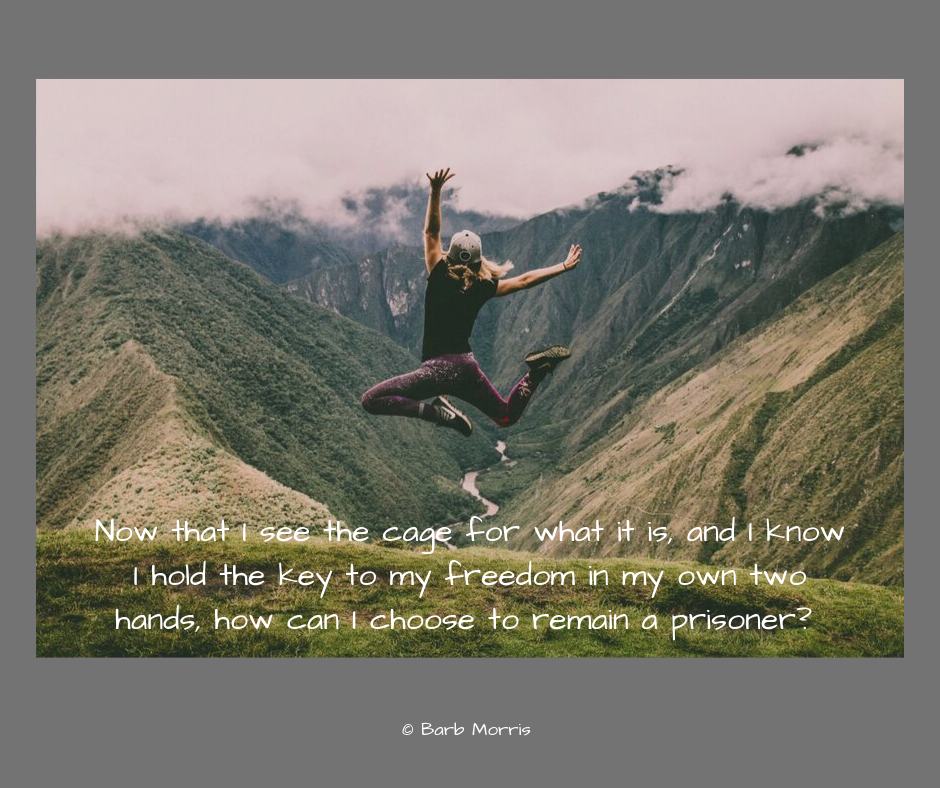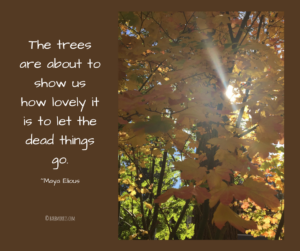
“The trees are about to show us how lovely it is to let the dead things go.” That’s a quote from Maya Elious, and how poignant it is. We had snow last Saturday here in Bend, and now the trees are letting go with a vengeance, dropping leaves and fruit all over the place.
Do you remember the song Sesame Street’s Hoots the Owl sings to his friend Ernie, who desperately wants to both play his saxophone and keep ahold of his beloved rubber duckie? Hoots sings, “Put down the duckie. Ernie, put down the duckie. You gotta put down the duckie if you wanna play the saxophone.” (Watch it here.)
I grew up in a family with alcoholism and physical violence. My parents eventually divorced. When I was in high school, my mom married a man, a family friend of many years, who touched my body and said things to me that no stepfather should say to a stepdaughter. When I protested, he told me I was wrong. My mom did not protect me.
What do falling leaves, Hoots the Owl’s song to Ernie, and growing up have to do with each other?
As a daughter in my family, a student in the public schools of the 60s and 70s, a girl in a persistently patriarchal church and misogynist culture, I picked up a few beliefs. They might sound familiar to you.
- Be small, hidden, camouflaged.
- Be silent. Stay quiet.
- Do as you’re told.
- Keep your wants, opinions, thoughts, and feelings to yourself, because they don’t matter.
- Whip yourself into shape.
- Be who we want you to be.
- Look to others for direction, validation, affirmation, approval.
- Put others’ needs ahead of your own.
Be nice, sweet, cute, pleasing, funny, smart but not too smart, helpful, compliant.
In short, be a good girl and don’t bother us.
It was safer, when I was a child, to just go along with this. I wasn’t big or brave or powerful enough to go it alone. And after a while I forgot who I was. It was easier to forget than to keep feeling the pain of remembering.
I’m remembering now. I’m learning to truly see the ways my visibility, clarity, voice, value, integrity, intrinsic motivation, self-compassion, self-regard, and self-trust were taken offline, uninstalled by my family, my culture, and my church.
Now that I see, I’ve gained the ability to choose what to do. I can choose the discomfort of reinstalling those original blessings and rewiring (unf*cking) my brain, or I can continue to stay small quiet nice cute sweet reactive other-focused because that’s more familiar and feels safer. I can hang on to last year’s leaves, or I can choose to let the dead things go.
Wholeness, healing, and new life lie in the direction of putting the damn duckie down. Relearning is uncomfortable and scary. But staying locked up in this cage of smallness, silence, and compliance is no longer an option for me.
Now that I see the cage for what it is, and I know I hold the key to my freedom in my own two hands, how can I choose to remain a prisoner?
If you’d like some Bible alongside Sesame Street, here’s Paul writing to the church in Corinth: “When I was a child, I spoke like a child, I thought like a child, I reasoned like a child; when I became an adult, I put an end to childish ways.” (I Corinthians 13:11)
Holiness wants us to grow up. Holiness wants us clear and articulate and powerful.
We gotta put down our childish duckies if we wanna play our grown-up saxophones.
You may not want to play the saxophone, but I know you have dreams. Goals. Desires that just won’t let go. And if you haven’t achieved them or let them go, there’s something stopping you. There’s an obstacle in the way, almost certainly a belief or a cluster of beliefs that no longer serve you, if they ever did.
I can help you see where your childish beliefs are holding you back so you can change them and be the grown-up woman you want to be. Contact me for a free consultation.
Photo by Peter Conlan on Unsplash, edited on Canva

